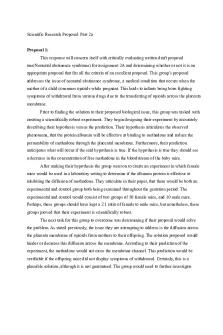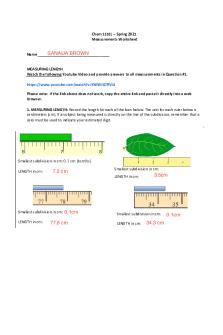2a Measurements and Scientific Notation PDF

| Title | 2a Measurements and Scientific Notation |
|---|---|
| Course | Air Pollution |
| Institution | University of California Los Angeles |
| Pages | 2 |
| File Size | 75.6 KB |
| File Type | |
| Total Downloads | 5 |
| Total Views | 168 |
Summary
Professor Lew...
Description
Part 1: Introduction to Measurements Way of determining how much pollution is in the air → can compare levels from one day to another - Ability to measure is one of the most fundamental aspects of science → need standardized measurements and units Important measurements in air pollution: - Density - Concentration and Mixing Ratio Concentration = number of molecules of a substance per unit volume C = N/V - N=number of molecules in moles - V=volume in units of cubic meter (m^3) - C has units of mol/m^3 Quiz Questions: 1. At what temperature does water freeze on the Kelvin scale? ___ K [nearest whole number] a. 273.15 K 2. What temperature should your radiometer read in C if we are roasting chicken? a. 163C for 325F Part 2: Scientific Notation Powers of ten by using an order of magnitude (is a multiple of ten) - 100 is one order of magnitude larger than 10 because it is 10 times 10 = 10 * 10^1 - 0.001 is two orders of magnitude smaller than 0.1 because 0.1*10^-2 Quiz Questions: 1. Write this number in scientific notation; 4,839,726,310 a. 4.84^10^9 2. Write this number in scientific notation; 0.00037021886 a. 3.70E-4 3. Which of the following is the smallest number? a. 1.75*10^13 4. How many billions does the following number represent N*10^9? 57,390, 274,193,056 a. 57390 Part 3: Units of Measurement Units are very important -- without them, numbers are meaningless Fundamental Units
Parameter
English System
CGS System
SI System
Length
Inch (in)
Centimeter (cm)
Meter (m)
Mass
Pound (lb)
Gram (g)
Kilogram (kg)
Time
Second (s)
Second (s)
Second (s)
Temperature
Fahrenheit (F)
Celsius (C)
Kelvin (K) or Celsius (C)
SI System is what we’re looking at and focusing on Length: Meter - 1 meter (m) = 100 centimeters (cm) = 1000 millimeters (mm) - 1000 m = 1 kilometer (km) - 1 m = 39 in - 1 in = 2.54 cm - 100 m = 110 yards - 1 mile = 1.6 km Mass: Kilogram - Weight of 1 liter (L) of distilled water - 1 kilogram (kg) = 1000 grams (g) = 10^6 milligrams (mg) - 1 metric ton (t) = 1 tonne = 1000 kg - 1 kg = 2.2 pounds - 1 pound = 450 grams - 1 tonne = 1.1 English ton (or ton) Time: Second - Always seconds in each system Units derived from basic measurement units Area = L1 * L2 - A = 1m * 1m = 1m^2 Quiz Questions: 1. Match the types of measurements in the first group with appropriate units in the second group a. Mass = kg b. Time = hr c. Volume = m^3 d. Area = cm^2 e. Length = km 2. Compute the volume of dimensions L1 = 1 m, L2 = 500 mm, L3 = 200 cm a. 1m*.5m*2m=1m^3...
Similar Free PDFs

Scientific notation notes
- 3 Pages

Scientific-notation-wikipedia
- 8 Pages

Scientific Notation Unit Test
- 3 Pages

Notation
- 3 Pages

Functions and Function Notation
- 4 Pages

A Measurements and Errors ppt
- 9 Pages

2- Momentum AND Vector Notation
- 9 Pages

2a - pro 2a argument paper
- 3 Pages
Popular Institutions
- Tinajero National High School - Annex
- Politeknik Caltex Riau
- Yokohama City University
- SGT University
- University of Al-Qadisiyah
- Divine Word College of Vigan
- Techniek College Rotterdam
- Universidade de Santiago
- Universiti Teknologi MARA Cawangan Johor Kampus Pasir Gudang
- Poltekkes Kemenkes Yogyakarta
- Baguio City National High School
- Colegio san marcos
- preparatoria uno
- Centro de Bachillerato Tecnológico Industrial y de Servicios No. 107
- Dalian Maritime University
- Quang Trung Secondary School
- Colegio Tecnológico en Informática
- Corporación Regional de Educación Superior
- Grupo CEDVA
- Dar Al Uloom University
- Centro de Estudios Preuniversitarios de la Universidad Nacional de Ingeniería
- 上智大学
- Aakash International School, Nuna Majara
- San Felipe Neri Catholic School
- Kang Chiao International School - New Taipei City
- Misamis Occidental National High School
- Institución Educativa Escuela Normal Juan Ladrilleros
- Kolehiyo ng Pantukan
- Batanes State College
- Instituto Continental
- Sekolah Menengah Kejuruan Kesehatan Kaltara (Tarakan)
- Colegio de La Inmaculada Concepcion - Cebu







